In this wonder-filled world, with so many cultures and religions to learn about, it is no wonder that some normal things to us may seem a bit too weird for others. With the invention of the internet and the ability to see what people celebrate at the smallest corners of the world, weird traditions get discovered and even adopted with much ease. The perfect example is American traditions, which are, thanks to its long history of migration, the result of cultures and religions mixing in with each other. Halloween? One of the many national traditions that were adopted by the American people. One might even wonder - what traditions which might seem to be weird are important to the people celebrating them?
The traditions that we see as weird usually come into existence from a backstory-rich background from two sources - culture or religion. That is what cultural traditions and customs are - processes and aspects passed down to people by their parents, relatives, and friends. However weird they may seem, weird customs are the foundation of a culture's history. A reminder of the beautiful past and what makes them unique. Sometimes, a new tradition can be started and become a national custom when its significance is recognized by the wider part of the public.
With one of the major traditions of the year, Christmas, approaching us on the calendar, it might be important to catch up on some of the weird traditions around the world. With the list below, take a look at the world around you and see what people celebrate due to their interest in those traditions. Upvote the ones that you think are cool in weirdness and meaning, and comment down below on the ones that maybe you celebrate too!
#1 There’s An International Hair Freezing Contest In Yukon, Canada
While others despise the winter season and drive it away, people from Yukon, Canada, celebrate this season in a freezing way: dunking their heads into hot springs and waiting for their hair to freeze over, and icicles to form. With temperatures reaching -30 Celsius, it is one of the weirdest, but coolest, traditions.

Image credits: Tahkini Spring Pool
#2 In Gloucestershire, England, People Gather To Roll Cheese Down A Hill
With Spring being the season of rebirth, when nature begins to show itself once more, it’s normal for people to celebrate. In Gloucestershire, England, locals and visitors gather around to roll cheese down a steep and grass-field-covered hill and chase them. While dangerous to the participants, it still attracts plenty of people each May.
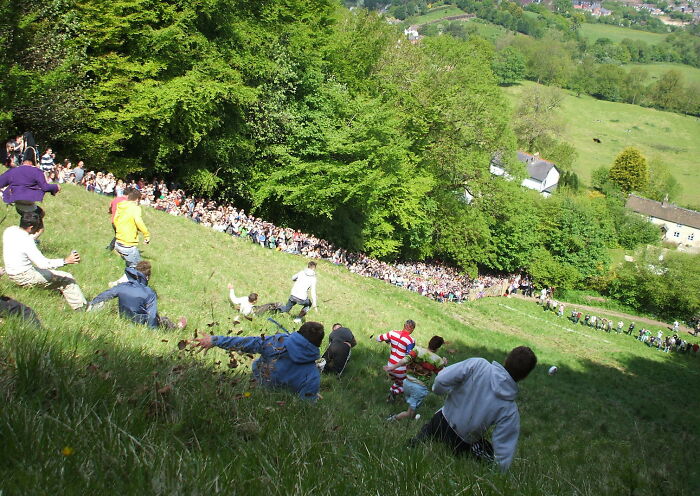
Image credits: Dave Farrance
#3 Castrillo De Murcia In Spain Has A Baby Jumping Festival
Some cultures view a child's birth as a gift not only to the nation but also to the culture overall, a new member to celebrate. To prepare them for the future, in Castrillo De Murcia, Spain, local people bless the babies born the previous year by allowing a “devil” to jump over them. With no injuries reported, it is a tradition that dates back to the 1600s.
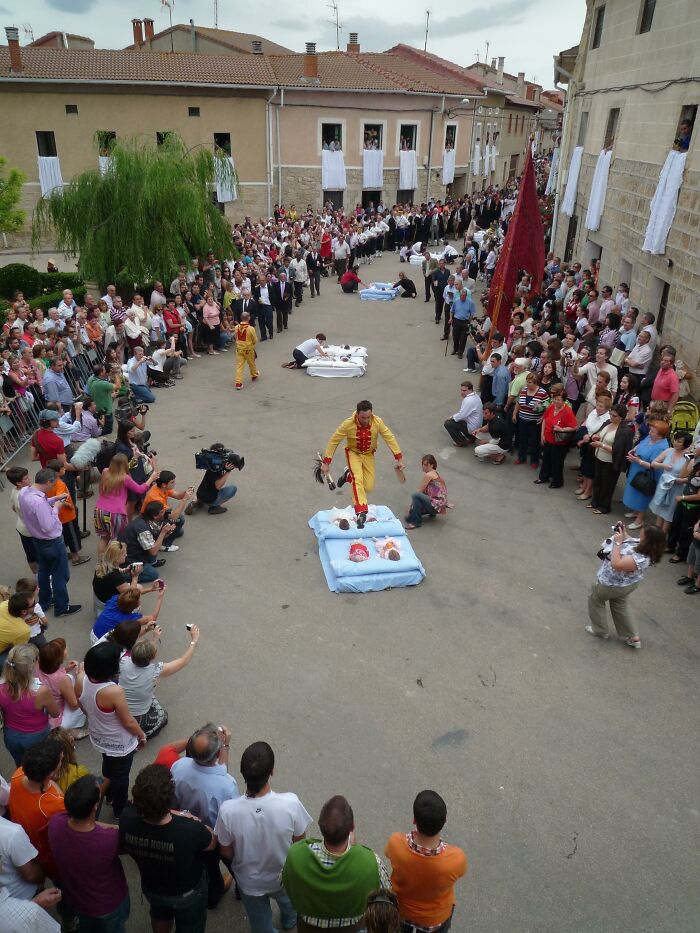
Image credits: Celestebombin
#4 Boot Tossing, Finland
No one can debate that shoes have to be worn on the feet, but the Finnish have a unique way of using their shoes for the sake of tradition. The title of oddest sport belongs to Finland. Boot tossing has been practiced for generations, just like wife carrying.
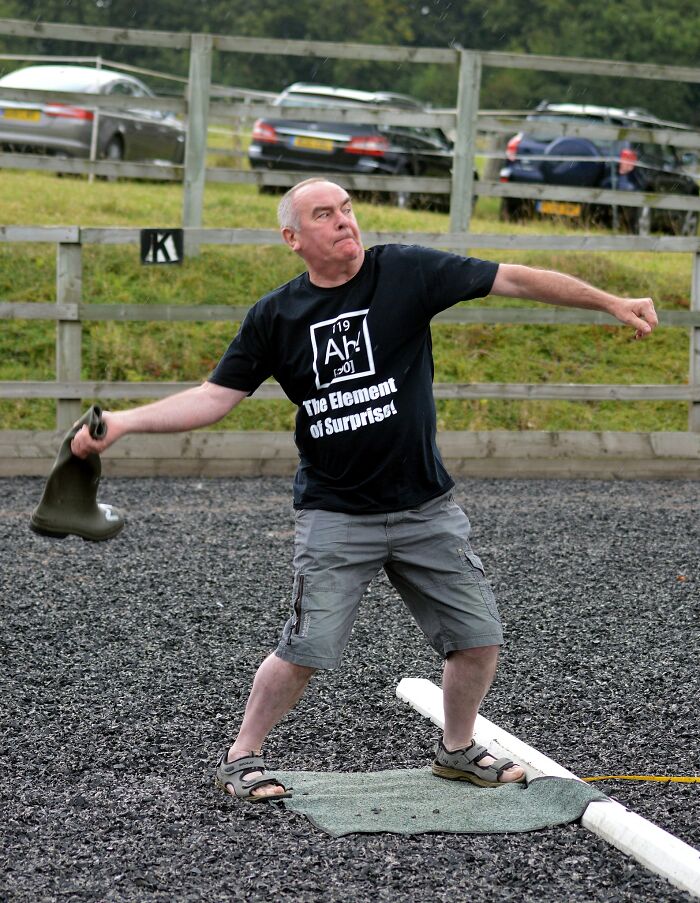
Image credits: Russ Hamer
#5 Midsummer Day, Lithuania
Lithuanians celebrate the warm season of summer with the day of Midsummer. During this day, young women must only wash their cheeks with fresh dew in the morning. Later in the evening, people gather around bonfires in the countryside and around the cities to make wishes and cast spell bags into the water to bring their desires to pass. Young couples also visit rural areas to look for fern blooms.
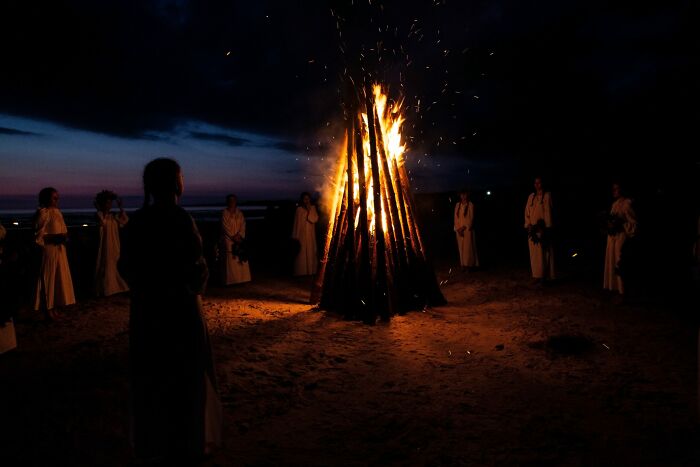
#6 In Lopburi, Thailand, The Residents Prepare An Annual Feast For The Local Monkeys
Humans are part of nature so it is important to include a bit of the natural aspect into your tradition. Lopburi, Thailand has the tradition of preparing some food for the local monkeys that surround the town. From watermelons to lettuce and more, it is done to bring good luck not only to the people but also to gain favor from the monkeys who bring that luck to the region.
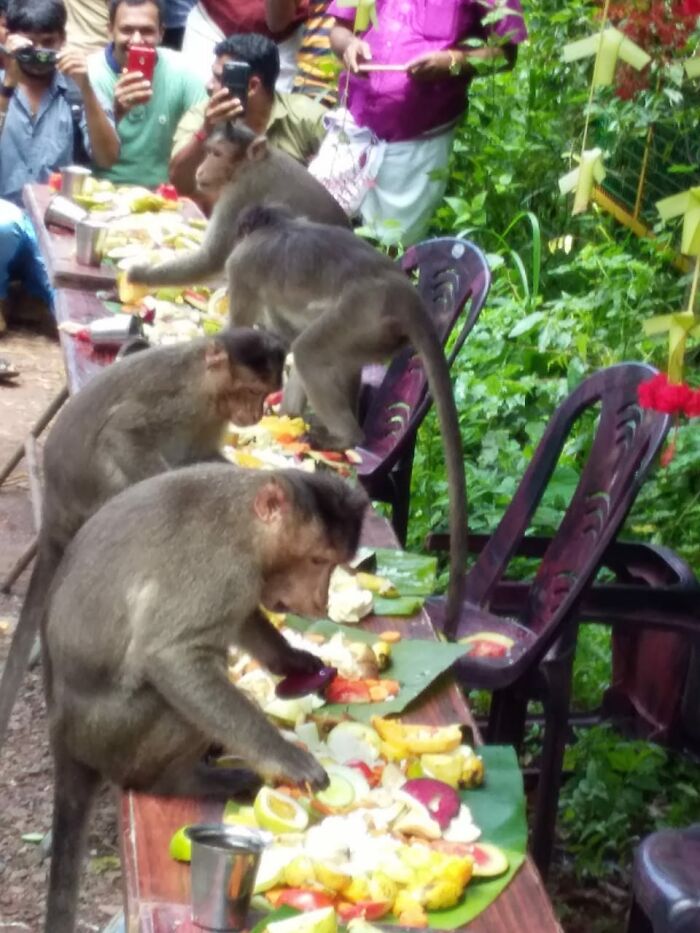
Image credits: Ajamalne
#7 Oaxaca, Mexico, Has A Massive Radish-Carving Festival During The Holiday Season
Radishes - we grow them in our gardens and most often buy them at the store when the appetite arises. In Oaxaca, Mexico, the radish-carving tradition dates back more than 120 years. Local people carve out figures and statues from the radishes they grow and display them to other locals and visitors of the region.
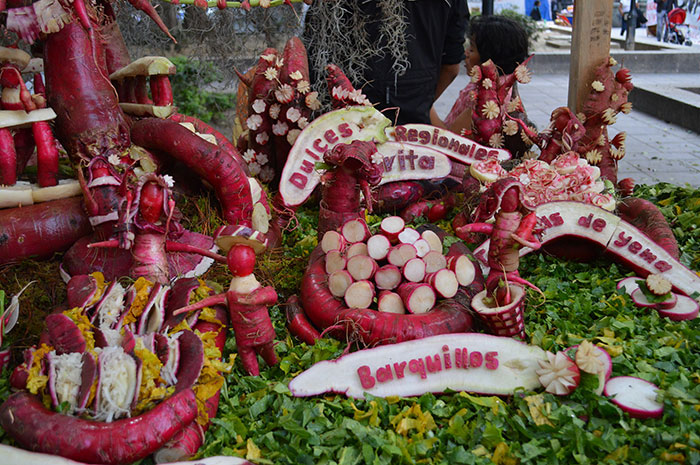
Image credits: AlejandroLinaresGarcia
#8 Polterabend In Germany
To add to the previously mentioned wedding traditions, Germany added a little bit of spice to the traditional way weddings are conducted. The day before the wedding is to happen, friends and family gather to smash different things on the floor of the happy couple. From plates to flowerpots, there are few things that are safe from destruction. After the mess is made, the soon-to-be newlywed couple clean everything up, setting a strong foundation for their future.

Image credits: Stefan-Xp
#9 The Mari Lwyd, Wales
Welsh Christmas customs like the Mari Lwyd date back to the first half of the nineteenth century. A horse's skull is embellished, and it is then mounted on a broomstick. The skull seems like the head of some scary horse because the person holding the stick is draped in a sheet. The horse will stop and knock on every door before moving on. When a door is opened, the people who have gathered around the horse start singing and requesting admittance inside the house.

Image credits: R. fiend
#10 A Groundhog Predicts How Long Winter Will Last In The United States
Predicting the future is hard for people, no one can do it with 100 percent accuracy, but animals are more predictable. In the United States, groundhogs are said to predict the future of the winter season's end - if it’s going to stay a bit longer, most often six weeks, or if it’s going to give way for the upcoming spring. If the ceremonial hog sees a shadow, you're going to have to wait a bit longer for the warm weather.
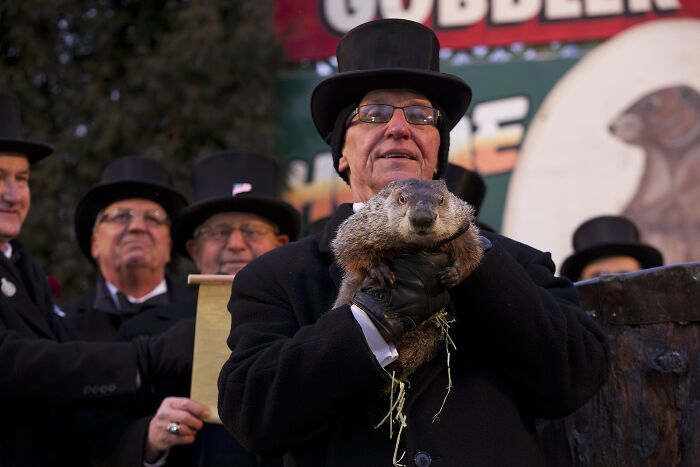
Image credits: Anthony Quintano
#11 Buñol, Spain, Hosts A Massive Food Fight Where Overripe Tomatoes Are Used
Tomatoes have become a staple of many cuisines around the world, but the Spanish people have taken it to further levels. In the city of Buñol, there is an event where a fight about food happens, and the ammunition? Overripe tomatoes. A friendly fight, trucks are brought in with tomatoes and the ensuing chaos covers the people and the city overall in tomatoes.
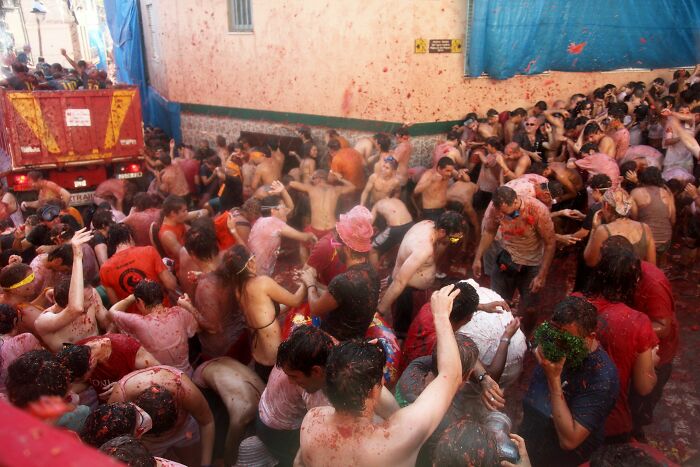
Image credits: flydime
#12 If You’re Not Married On Your 25th Birthday, In Denmark You Might Be Doused In Cinnamon
With Denmark being on the straits separating the Atlantic Ocean and the Baltic sea, it was only normal that some amenities from the west would come there. The Danish adopted the spices into their tradition as a way to play a funny joke on the people. If you are not married by the time you're 25, expect some cinnamon to be thrown at you. If you are over 30, be ready for some black pepper to be thrown too.

#13 “Partita A Scacchi”, Marostica, Italy
Chess is a game of strategy and thinking, making it quite boring to some people. The northern Italian town of Marostica is extremely delighted to host a human chess game every two years in September. The custom has its roots in a narrative from the fifteenth century. A product of a love triangle, it is one of the most fun traditions to partake in.
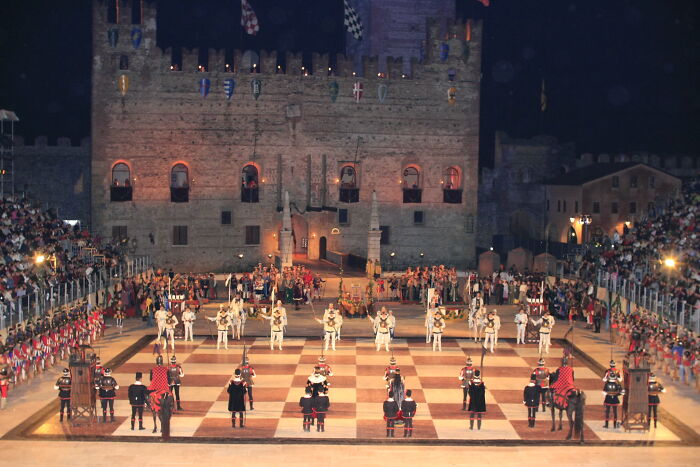
Image credits: Patrick Keogh
#14 The Frog Dance (Små Grodorna), Sweden
Don't worry if you've seen Midsommar, the scary horror movie with a Swedish setting. If you decide to visit Sweden during their midsummer solstice events, there won't be anything similar. To the pace of upbeat music, players dance around a maypole while hopping like frogs and using motions that depict body regions that frogs lack.
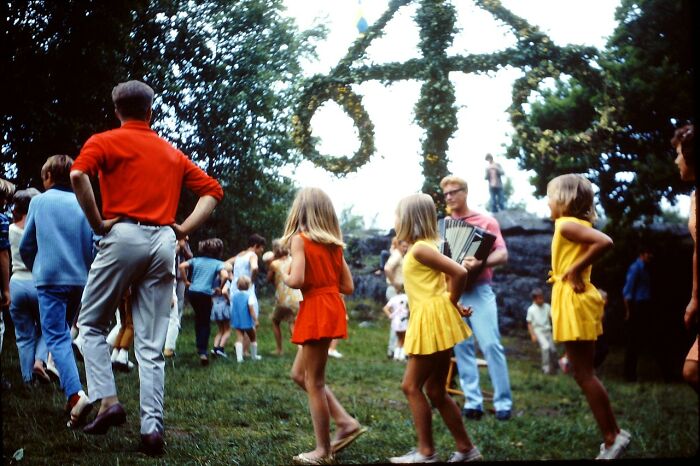
Image credits: Mikael Häggström
#15 The Thaipusam Festival
This Hindu holiday is celebrated at the start of each year by people from the Tamil community. It is held on full moon nights and is devoted to Lord Murugan, the god of war. They carry out other physically demanding procedures, such as piercing body parts with long silver pins. Anything for the good of the gods.
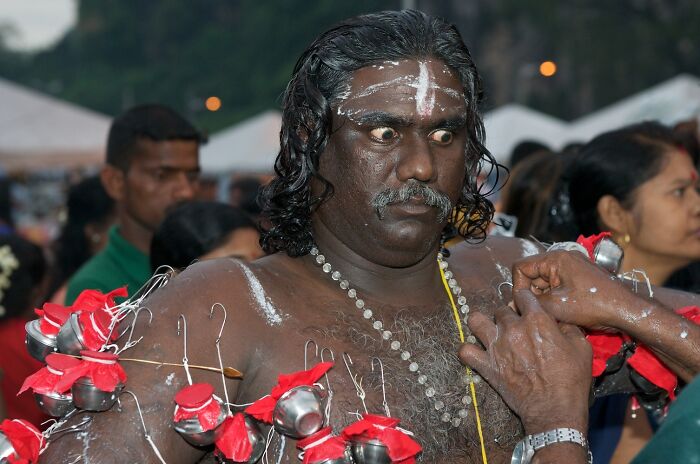
Image credits: Peter Gronemann
#16 Festival Of Scrambled Eggs In Bosnia
Eggs are one of the most popular foods to eat in the world. It’s a universal food which perfectly combines with many other foods. But Zenica, Bosnia has taken it a step further. To welcome the spring season, local people cook scrambled eggs in the morning and spend the rest of the day on leisure activities, relaxing and partying all around.

#17 The Sausage Tossing (Eis-Zwei-Geissebei), Switzerland
On Shrove Tuesday at precisely 3:15 pm, a large crowd of kids and adults congregate in front of Rapperswil's city hall. When the mayor asks, "Are all my guys here?" the children yell out, "One, two, goat leg!" loudly and clearly. The mayor and council members then throw sausages, loaves of bread, and pastries into the throng after opening the windows.
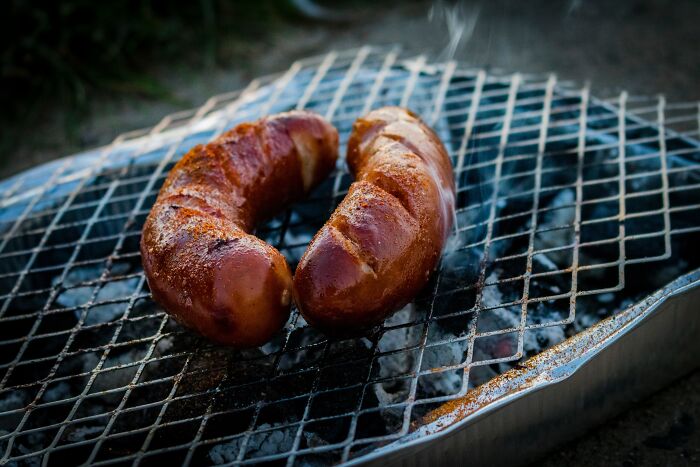
#18 Bathtub Regatta, Belgium
Water is a vital part of our existence. It keeps us clean, away from thirst, and sometimes even entertained. The beginnings of this one-kilometer-long race along the River Meuse in Dinant, Belgium, can be traced back to 1982. The floating device's use of a bathtub is one of the requirements for succeeding against up to 49 other competitors. It is encouraged to decorate the bathtubs.

Image credits: bbctravelshow
#19 Every Year, The Czechs Have A Witch-Burning Festival To Ward Off The Evils Of Winter
While some during the winter season build snowmen and such to celebrate it, the Czechs seem to hate this season with a burning passion. Literally. They construct straw and hay witches, which represent the winter season, and burn them to ward off winter and the cold weather. And some would say that it works every time!
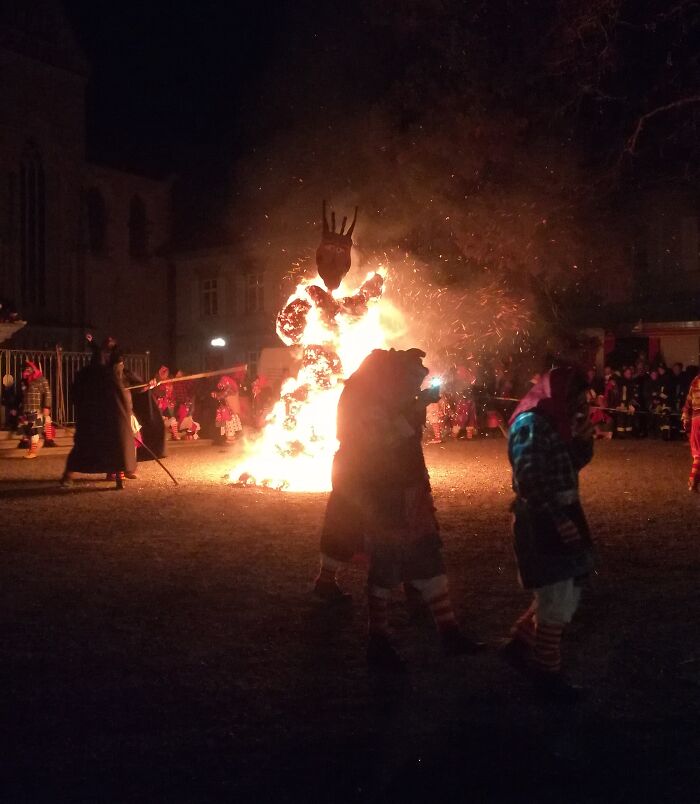
Image credits: Jacopissimo92
#20 The Russ Celebrations (Russefeiring), Norway
Norwegian high school students regularly observe Russefeiring during their last spring semester. Participants in this celebration drive similar cars, vans, and buses, wear colored overalls — often red — and party nonstop for two weeks. Authorities prepare themselves every year for ongoing public intoxication and unrest during the holiday.
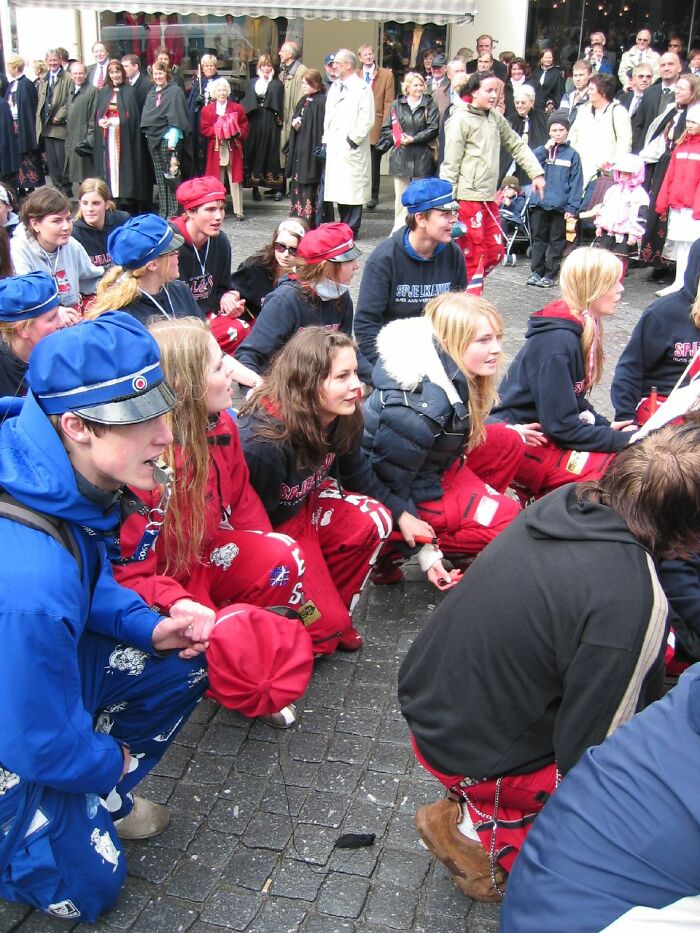
Image credits: commons.wikimedia.org
#21 The Giant Omelette (Omelette Géante), France
The inhabitants of the Southern French city of Bessières have a unique tradition to welcome spring: one day after Easter festivities, they prepare a massive omelet composed of more than 4,500 eggs that can feed up to 1,000 people in the town's central plaza. Existing since Napoleon's times, according to legend, Napoleon did the most to make this festival come to reality by ordering a large omelet to be made.

#22 Stonehaven, Scotland Celebrates New Year’s With Literal Balls Of Fire
While firework shooting has become the main tradition that everyone partakes in around the world, Stonehaven, Scotland has also integrated literal balls of fire into their celebrations. People gather around and swing blazing fireballs around to celebrate the occasion. It is said that this tradition dates back to the old age of the Vikings.
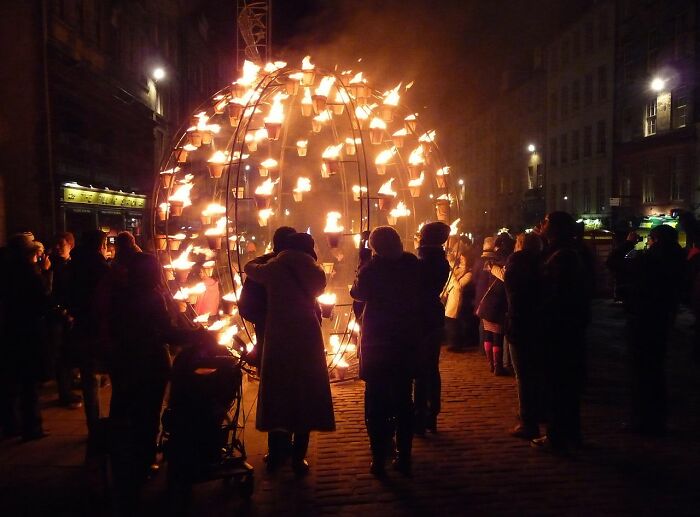
Image credits: John Lord
#23 Battle Of The Oranges In Italy
In Ivrea, Italy, every year, something very odd happens during the three days before Mardi Gras. The locals split into nine distinct squads, wear war gear, and over the course of several days, throw oranges at one another in an effort to eliminate the other teams. This game's ancestry is unknown.
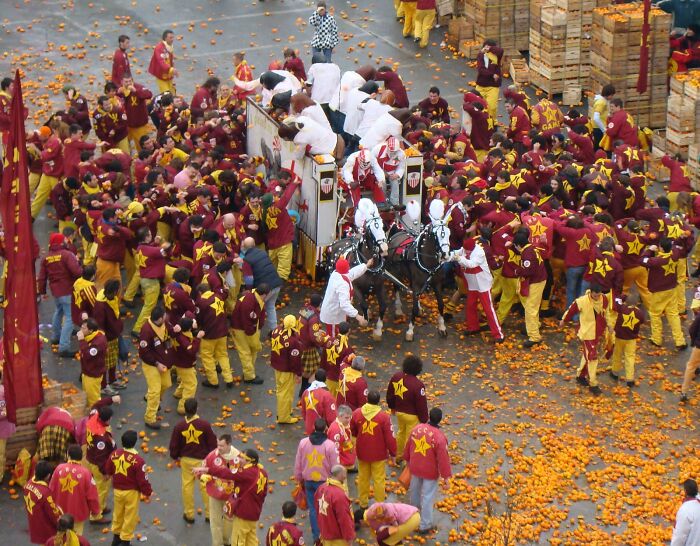
Image credits: Lupo
#24 The Puck Fair, Ireland
The small town of Killorglin, which hosts Ireland's oldest and oddest festival, is located deep within one of the country's most renowned landscapes. A wild male goat called a "puck", who is crowned monarch of the town for three days during this ancient festival, becomes King Puck. He is positioned in a tall cage in the town square where he can observe everyone.

Image credits: User:Itub
#25 Caber Toss, Scotland, UK
With sports being a way of improving oneself, it is not so uncommon to celebrate strength by showcasing it to other people. The traditional Scottish athletic contest involves men wearing kilts tossing a big pole called a caber, and it is practiced at the Scottish Highland Games. In contrast to modern sports, tossing is more about the position the pole lands in than it is about how far it travels. The pole must be thrown with its thinner end facing away from the tosser and land flat on the ground with its larger end.
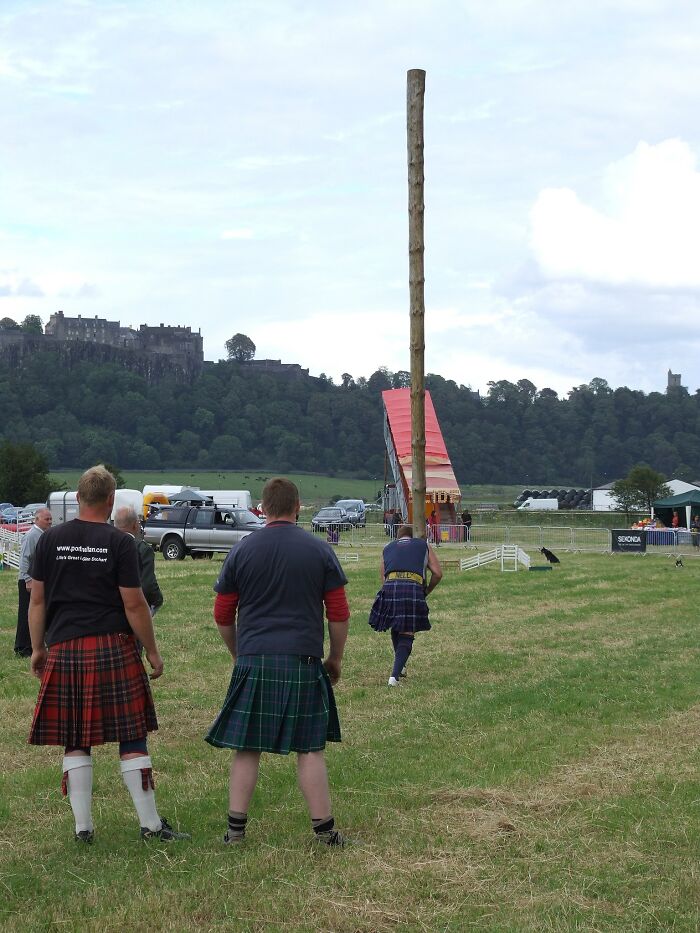
Image credits: L E X commons
#26 The Danube Race For The Cross (Plivanje Za Casni Krst), Romania
One of the strangest customs in Europe is practiced by the Romanians: a young guy swims in the icy river while a hundred or more spectators watch an Orthodox priest toss a cross into the water. It probably helps that everyone drinks homemade vodka before the occasion. If you can return the cross to safety, you will experience luck for a full year.
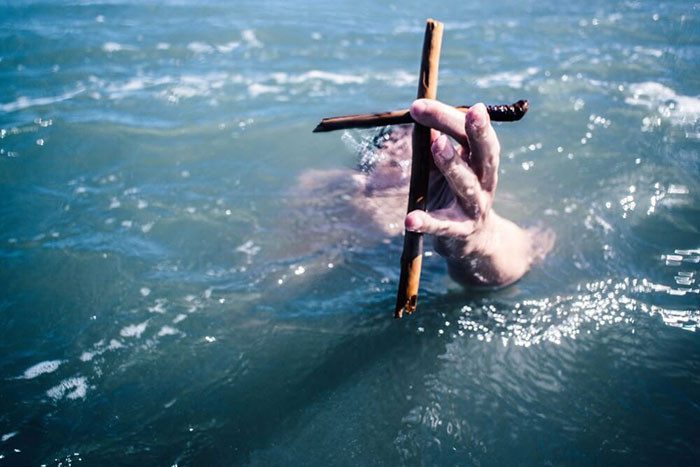
Image credits: photo_collections
#27 The Wife Carrying Race (Eukonkanto), Finland
To test their strength, Finnish men participate in the sport contest known as “wife-carrying”. The history of this contest in Finland is a little murky, originating in the 19th century, when a thief was alleged to have carried all he stole on his back, including the women.

#28 Famadihana
Funerals are a sad occasion, but sometimes, there can be happiness seen in it. A tribe in Madagascar known as the Malagasy practices a burial custom called famadihana. To honor the deceased's life, this tradition entails dancing with their bodies. People dance with their bodies as they are removed from the grave, rewrapped in new fabric, and then carried. One of these ceremonies is carried out every seven years.
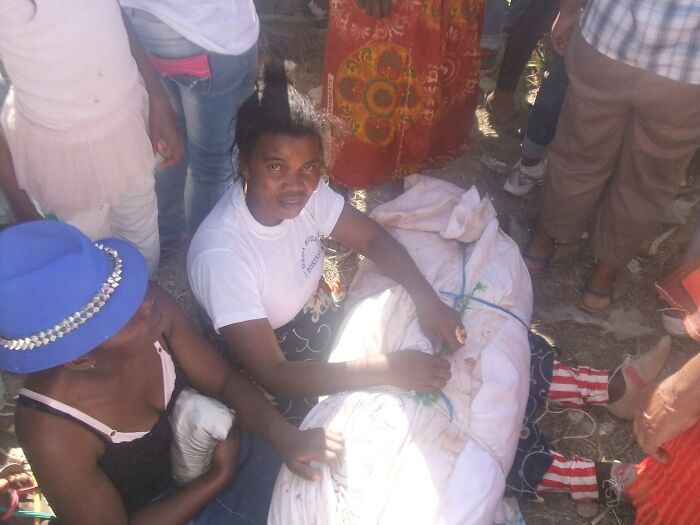
Image credits: Eric rakotomalala
#29 Cherry Pit Spitting, Michigan
The International Cherry Pit Spitting Championship, hosted at the Tree-Mendus Fruit Farm in Michigan, celebrated its 46th anniversary in 2019. Eat the cherry and spit the pit as far as you can is all there is to it. It is not permitted for contestants to "pop" their cheeks with their hands, and no props or other items are permitted.
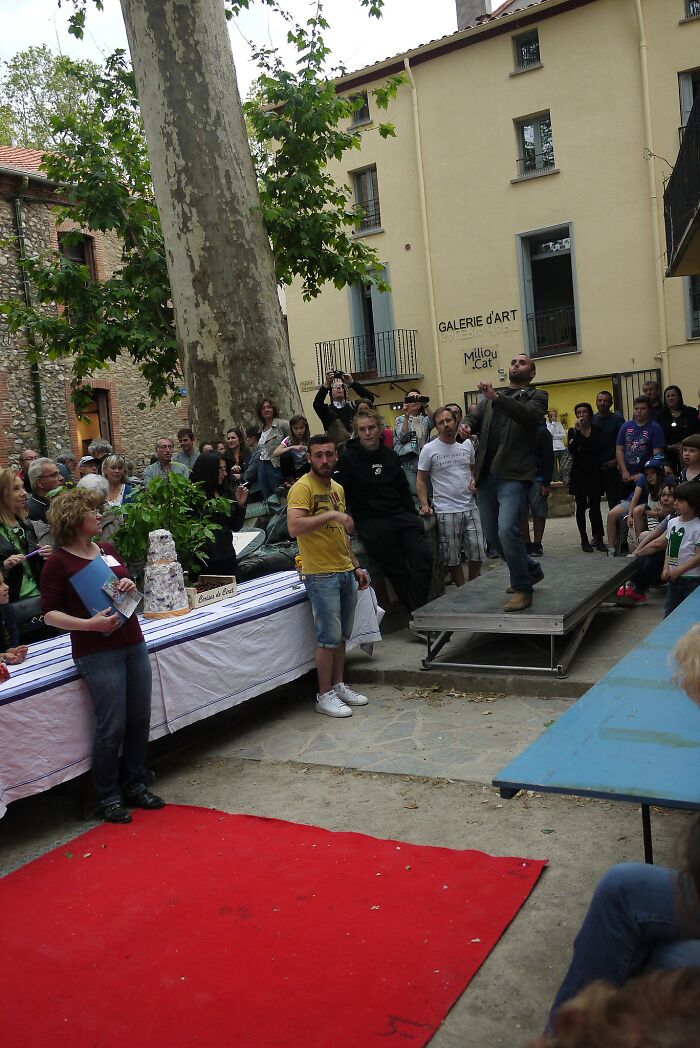
Image credits: Fabricio Cardenas
#30 The Battle Of Rockets (Rouketopolemos), Greece
In a little hamlet called Vrontados on the Greek island of Chios, two churches stand across from one another in a ravine. Then on Easter, opposing members try to use rockets to ring the bell of the rival church. The winner is reportedly determined by counting direct hits on each belfry the following day, yet each parish consistently asserts victory.
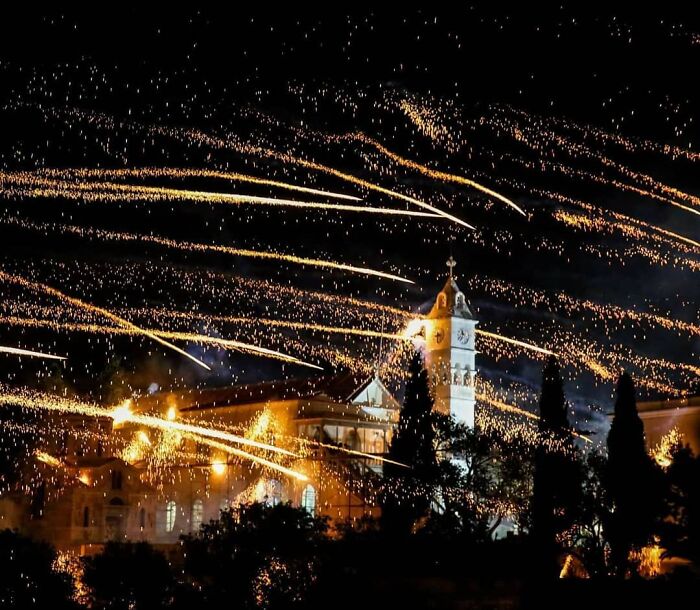
Image credits: unknowcnngreecen
#31 Coal Walking In China
Throughout the world, babies are born, but China places a unique emphasis on this event. The arrival of a newborn is surrounded by numerous customs and rules. The strangest custom involves the husband carrying the pregnant woman over hot coal before they enter their home. Naturally, he must perform it without shoes.
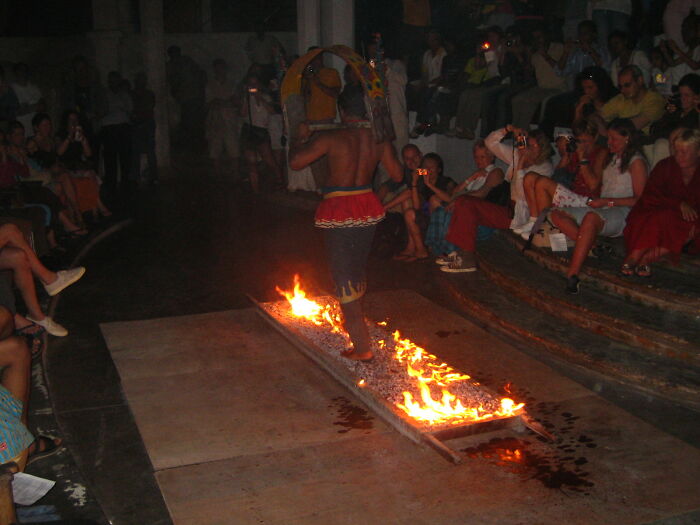
Image credits: Aidan Jones
#32 The National Hollerin’ Contest, North Carolina
Phones are rather a new invention, so hollerin’ is still not a forgotten art in our society, especially in the USA. Hollerin' was a highly developed method of communication over great distances that was particularly well-liked in the American Southeast. It is a combination between a yodel and a hunting cry. The National Hollerin' Contest was established in 1969 in Spivey's Corner, North Carolina, to carry on this fun custom, and it has continued every year since.

Image credits: Gerry Dincher
#33 Congratulating The Entire Family On One Person’s Birthday, Netherlands
Sometimes, the birthday is a celebration not of the person who is turning a year older, but of the entire family, who support the birthday boy or girl. It's customary in the Netherlands to celebrate birthdays by giving well wishes to the celebrant's family members as well as the actual birthday boy or girl.

#34 Flag Throwing In Tuscany, Italy
Although the Tuscan region is known for its wine, olives, pasta, and Tuscan sun, flag-throwing is a particularly significant custom. Young men and women conduct synchronized flag tossing and catching acrobatic displays during festivals today, continuing this ancient tradition — a stunning sight to behold while visiting Tuscany!
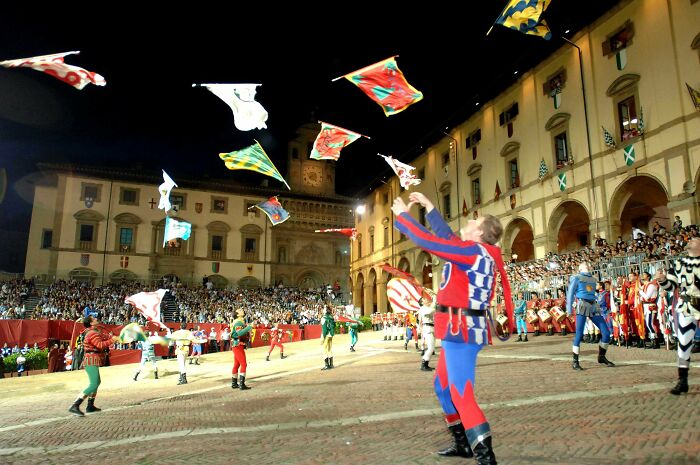
Image credits: commons.wikimedia.org
#35 Presidential Turkey Pardons
While Thanksgiving is celebrated by a few in Europe, it is a vital celebration in the United States. Since the 1940s, US presidents have received a Thanksgiving turkey at a formal ceremony and, on rare occasions, have formally pardoned the bird to save its life. And if you're asking whether this ceremony has a deeper significance or symbolic meaning, the answer is no.
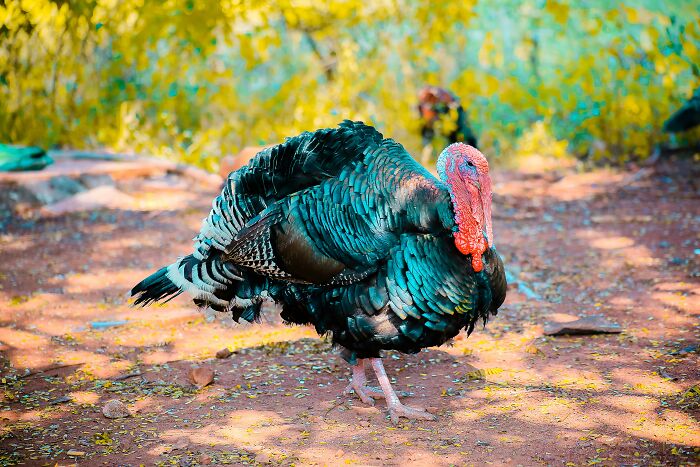
#36 Nenana Ice Classic, Alaska
The last frontier and the icebox of the USA, Alaska is probably one of the coldest places on earth. So there will most certainly be a tradition relating to Alaska's coldness. In one town in this state, people bet on when the river ice will break and a tripod is placed on the ice to track the time. When the ice eventually breaks, the winner gets quite a pool of prize money.

Image credits: James Brooks
#37 Baby Tossing In India
The child's safety must be secured every second, but in India, it is customary to toss infants off the sides of temples as part of a rite. It is customary to bring your newborn back to the 50-foot-tall Sri Santeswar temple in India after getting married there and toss your child onto a cloth that is being held by both Muslims and Hindus below.

#38 The Maypole (Maibaum), Austria
Austria, like Germany, is not a stranger to weird traditions. On May 1st, Austrians typically erect and protect their maypoles, while the nearby rival village, as part of the tradition, try to steal them overnight. The rivals will usually steal only the decently portable ones, even though most of the maypoles will be protected against such possibilities.
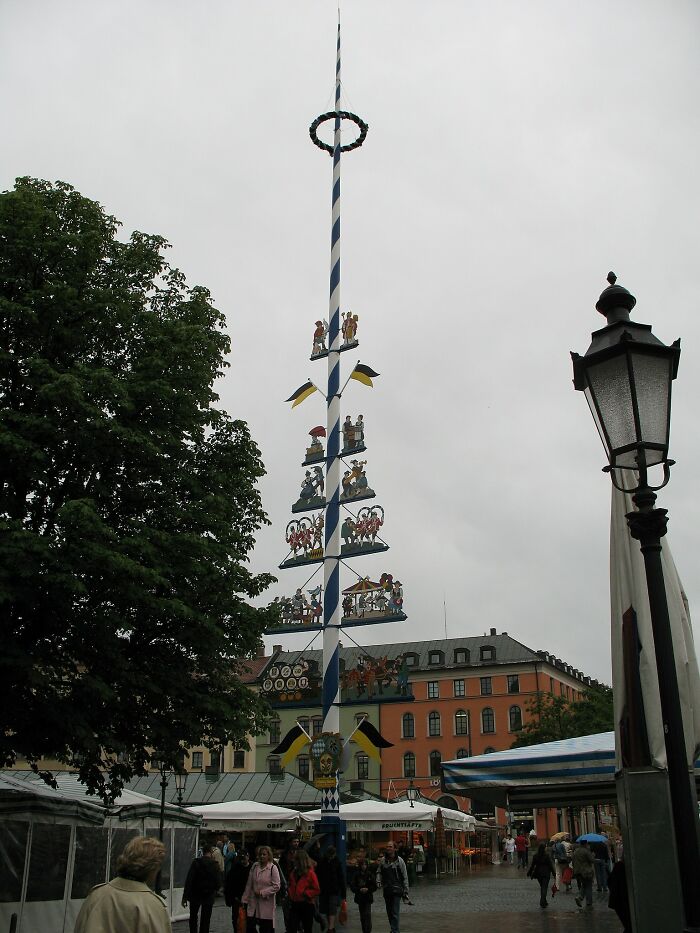
Image credits: Andrew Bossi
#39 Ostrich Racing, Arizona
Ostriches are interesting animals, sometimes thought of as being horses with wings and attitudes. When ostriches were originally introduced to the US in the 1880s, ostrich-riding competitions erupted in several states across the nation. The largest current race was held in 2019 at the Chandler Ostrich Festival in Arizona.
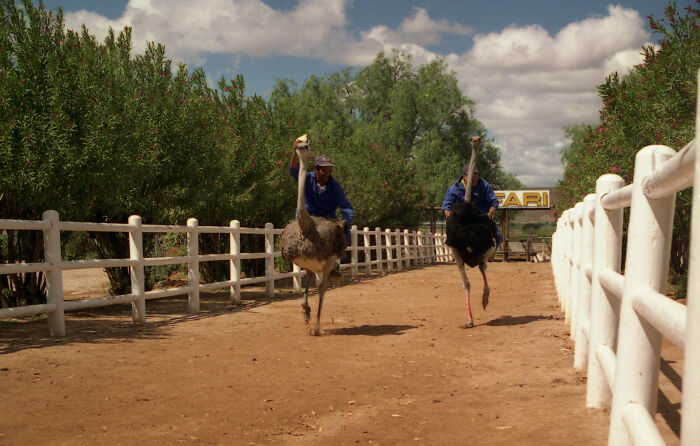
Image credits: Brian Snelson
#40 Shoving Faces In Cake In Mexico
While celebrating a birthday with a cake is normal every year, due to the importance of the occasion, smashing a face into the cake is quite weird. In Mexico, as a way of marking the celebration, the celebrating person has their hands tied behind them and as they go for the first bite, they get pushed into the cake while hearing “Mordida! Mordida! Mordida!” being yelled at them. One can’t forget, Mexico produces quite creamy cakes.

#41 Throwing Of Broken Dishes, Denmark
The Danish sure have a strange way of bringing good luck to themselves. Danish people store any broken plates, bowls, cups, or dishes throughout the year until New Year's Eve. To wish friends and relatives luck for the coming year, they hurl the broken dishes at their residences on the first day of the year.

#42 Cleaning Doorknobs On Your 30th Birthday, Germany
Germany is the homeplace of strange and weird traditions and they are proud of it. Women are expected to polish their best friends' doorknobs if they are still single on their 30th birthday. Men will be assigned different cleaning tasks. The only way to escape this bizarre custom is to kiss the other sex.

#43 Blackening Of The Bride: Scotland
The Scottish people have a strange way of expressing gratitude to newlyweds. The bride's friends and family assemble in Scotland to cover her with a variety of filthy and revolting items. They use filthy things like rotten milk, mud, and sauces. According to the notion, if a pair can endure the 'humiliation' that comes with the blackening, they can handle everything else life may throw at them.

Image credits: duncan cumming
#44 Rumspringa, USA
The traditional coming-of-age "Rumspringa" is an intriguing aspect of the Amish Church, which is undoubtedly distinctive. The Amish kids have their first taste of life outside the community when they become 16 years old. Rumspringa never wastes the teens' time in the outside world, whether they opt to come back or not.

#45 Smashing Coconuts On People’s Skulls In India
With the gods above looking down, it might be a good idea to thank them in some way. The people in South India have an interesting way of showing their gratitude. Hindu followers in the southern part of India gather inside the temples and smash coconuts over their heads. Maybe it's the gods giving their blessing to the participants, but little to no injuries have yet been reported.
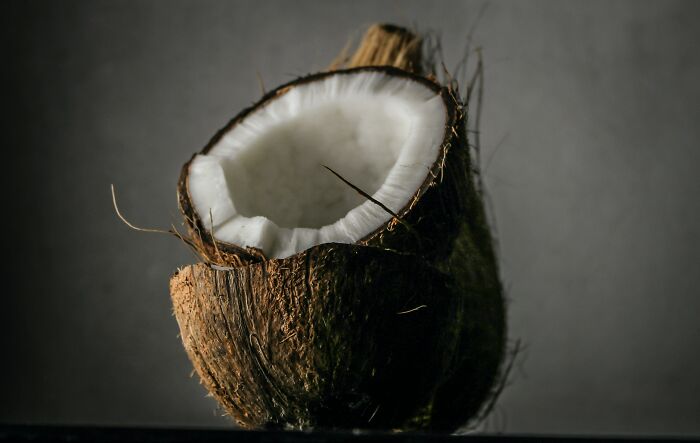
#46 Teeth Tossing In Greece
While the tooth fairy can visit every culture in this world, not everyone wants them inside their homes. In Greece, children throw their teeth to symbolize the liberation of the roots of their teeth.

#47 Pumpkin Chucking, Delaware
Spewed out from the earth, pumpkins are a wonder for the USA culture. Every year, the state of Delaware hosts Punkin Chunkin, the first and biggest pumpkin tossing competition in the nation. To launch the pumpkins, competitors employ trebuchets, catapults, torsions, and air guns. The longest distance was 1.4 kilometers.

Image credits: Tory
#48 The Month Of Þorri (Þorrablót), Iceland
The world's most repulsive food—sour ram testicles, boiled sheep skulls, blood pudding, liver sausage, and fermented shark—is consumed by many Icelanders during the "feast of Thorri" in January. In texts from the middle centuries, Thorri is portrayed as a personification of winter. This tradition is a great opportunity to taste some strange foods.

#49 Finger Cutting Of The Dani Tribe
The passing of a loved one hits everyone differently and everyone solves the grief problem in different ways, but the women of the Dani Tribe in Indonesia probably have one of the weirdest ways to deal with it. A woman's top finger joint will be amputated after they lose a loved one. The act is performed to ward off the spirit of the deceased and to represent the suffering experienced after losing a loved one.
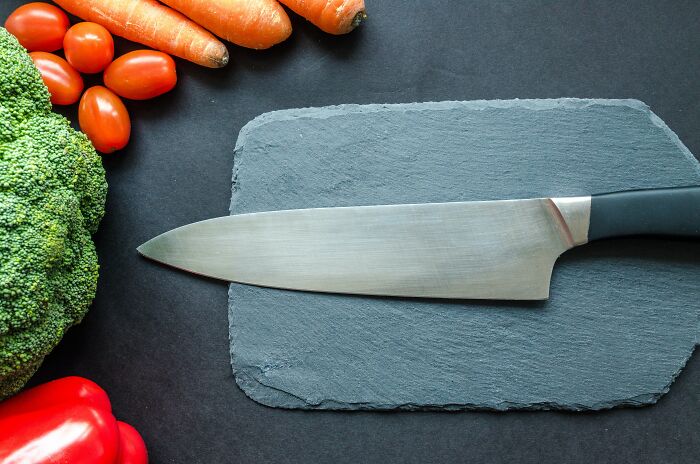
#50 Sinjska Alka (Chivalric Tournament), Dalmatia, Croatia
While knights and chivalry are associated with medieval times, the nation of Croatia, and especially the city of Dalmatia, still celebrate those times. Lances are used by knights riding horses at full gallop to strike an iron target consisting of two rings. Only men who were born in the Sinj region, however, are permitted to compete in the event.
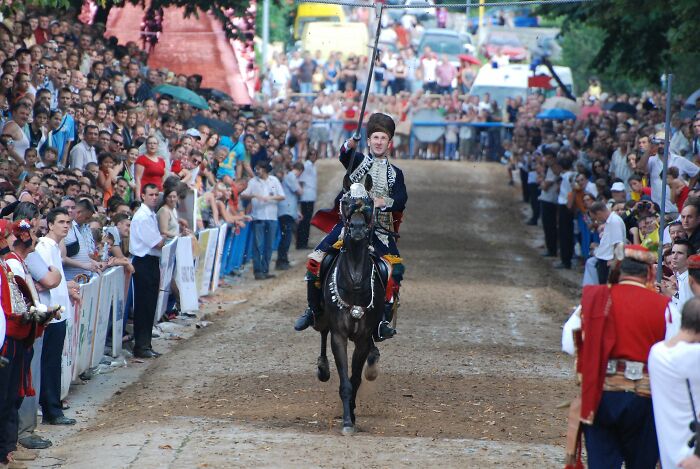
Image credits: PJL
#51 Ursul (Bear Dance), Romania And Moldova
The period between Christmas and New Year is usually a boring one, where preparations are made for the upcoming year. In Romania and Moldova, while a bit controversial, this period is celebrated by performers who wear real bearskin and dance a trained dance to pan flute and drum rhythms. The bears are resurrected after dying in the main act as a representation of rebirth.
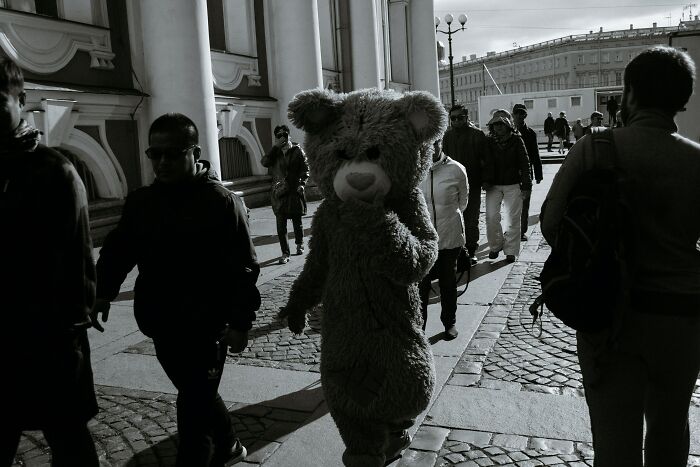
#52 The Hopping Procession (Lechternacher Sprangprëssessioun), Luxembourg
The "Hopping procession of Echternach," which takes place every Whit Tuesday in the eastern town of Echternach, is one of Luxembourg's most well-known celebrations and dates back to the 16th century. Participants wearing white shirts and black pants jump like bunnies through Echternach's ancient alleyways to the crypt and past St. Willibrord's grave as a tribute to St. Willibrord, who founded a renowned Benedictine Abbey in the city.
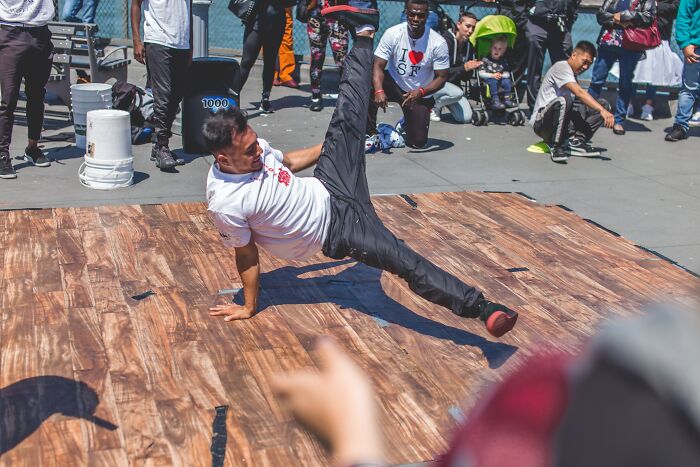
#53 Coming Of Age In Brazil
Brazil's Sateré-Mawé is an indigenous group of people. Boys in this tribe undergo a terrible coming-of-age ritual when they reach a specific age. This hideous custom entails wearing gloves that have been filled with bullet ants. It's common to compare the discomfort of a bullet ant bite to an actual bullet.

#54 Easter Whip, Czech Republic & Slovakia
Easter, a celebration of a Christian event, is celebrated in many nations with eggs and chocolate. The male populace of the Czech and Slovakian countries is only permitted to stroll through town whipping girls and women for fertility and luck on one day of the year, Easter Monday.
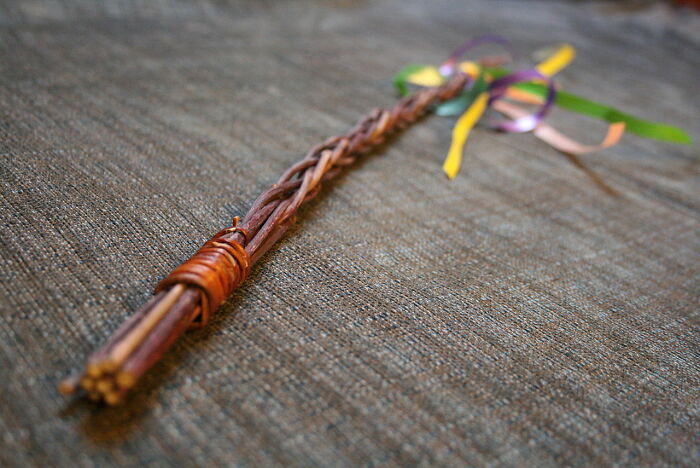
Image credits: Martin Strachoň
#55 Roadkill Cook-Off, West Virginia
With animals and people sharing nature around us, it is only normal that some accidents happen while driving on the road. The residents of Marlington, West Virginia, hold a Roadkill Cook-off every September where you can sample delicacies like biscuits topped with squirrel gravy and bear or deer sausage that has been marinated in teriyaki once picked up off the side of the road after an unfortunate accident.
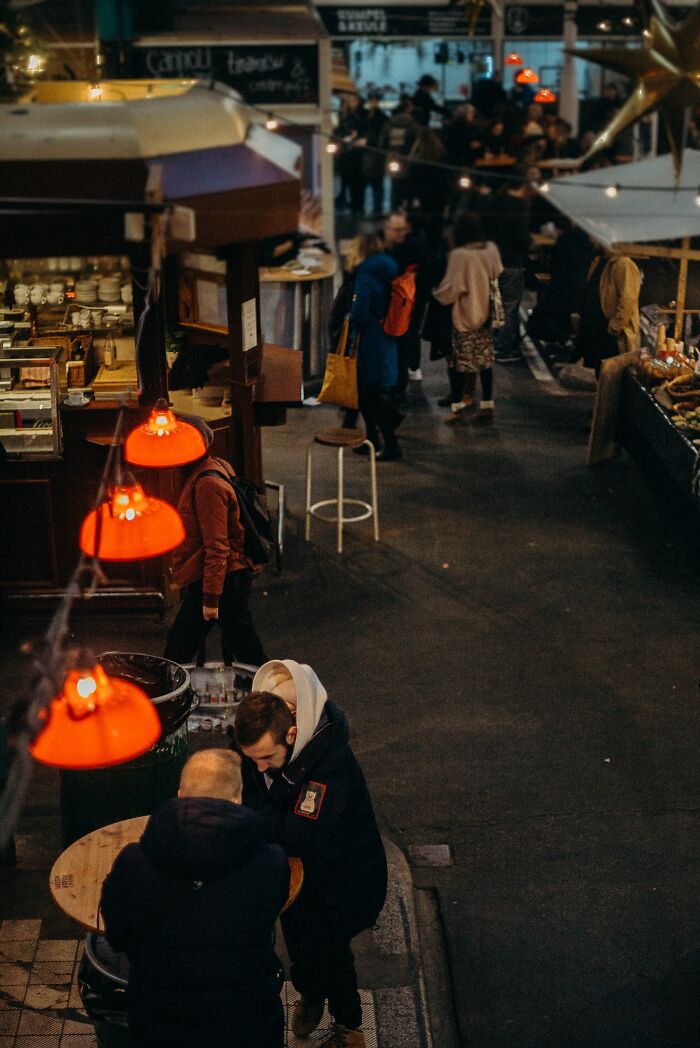
#56 Bhutanese Tradition
According to Bhutanese custom, young men must go on a new kind of quest in search of love and marriage, but they must do it in secret. If they are discovered to be dating an unmarried woman, the man will either be forced to wed her or, as a form of punishment, will be forced to work for her father.

#57 Throwing Pottery Out Of Windows, Corfu, Greece
Clay making is one of the arts that is hardest to master, so clay products are quite valuable these days. Large water jugs are dumped from balconies onto the ground in the middle of the town as part of this custom. It is a common misconception that it dates back to the Venetians' reign of Corfu from the 14th to the 18th century.

#58 Bride Kidnapping, Kyrgyzstan
Kyrgyz men have quite a cruel way of picking out their brides in these modern times. The laws of this ceremony are utterly odd and debatable, whether it involves consenting elopement or non-consensual abduction. According to this custom, the girl is kidnapped from her home and detained for days at the guy's house. The girl is then persuaded to marry her kidnapper by the boy's female relatives.
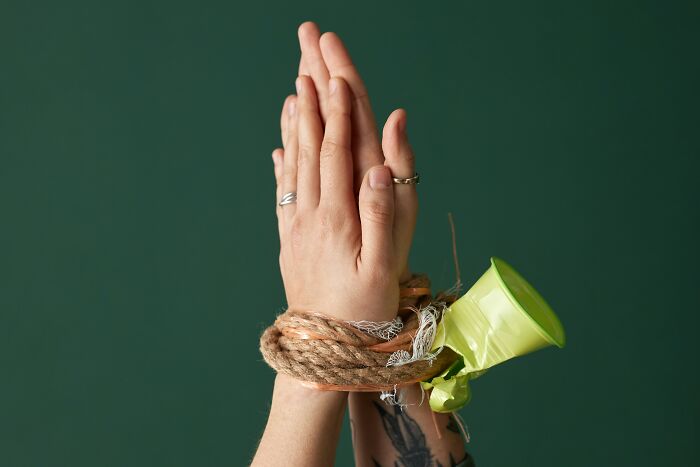
#59 Women Wearing Brass Ring Coils Around Their Neck, Kayan Tribe, Myanmar
The Kayan tribe of Myanmar's women have a distinctive beautification ritual that involves the wearing of several brass neck ornaments. The beauty of the coils increases with the number of coils. From the age of five, these girls begin donning the coils, and as they get older, the shorter coils are replaced with longer ones.
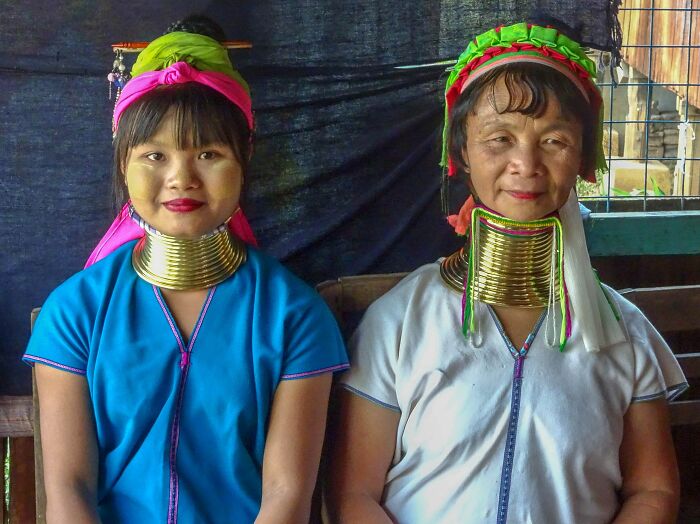
Image credits: Linedwell
#60 Camel Wrestling
Although it is also performed in other Asian nations, this tradition is particularly prevalent in Turkey's Aegean region. In it, two camels are shown fighting in front of onlookers. The camels are decked out in ceremonial attire, and the camel that does not run is declared the winner. In Turkey, this is virtually regarded as a sport.
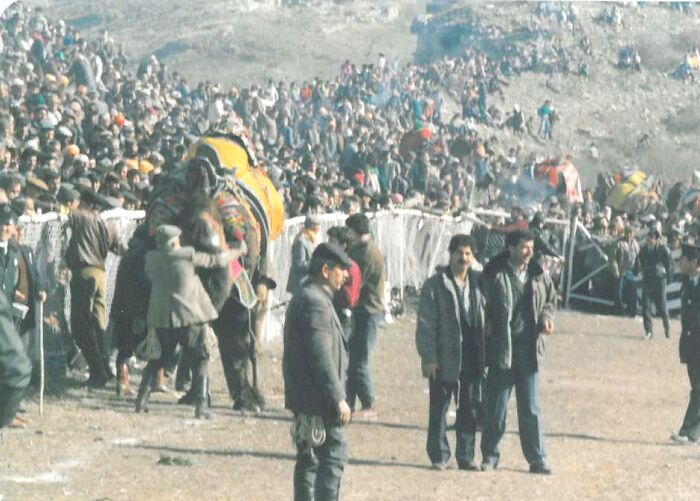
Image credits: Halit Edip Özcan
